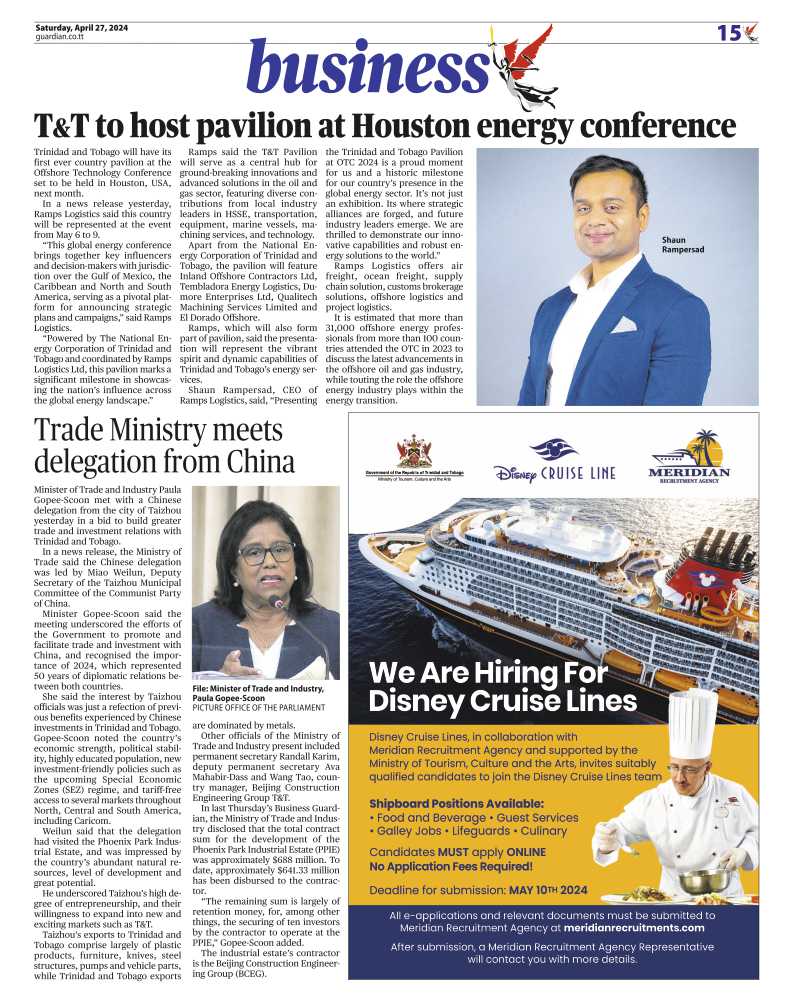Business
PwC report: CEOs less confident about revenues in 2026
Moonilal heading to India for energy conference
Ramps CEO: T&T must retain more energy wealth
Govt still working out asset tax, says insurance executive
CoE delay a travesty, says Permell
Central Bank pauses Clico trial for one week pending review
CEO leaving NCB Jamaica
Browne: Venezuela instability likely to impact import prices
Restaurants feeling the pinch of higher prices
Aventa CEO: Big does not mean bad
Promoters opt for smaller fetes amid cost surge
CSO: T&T inflation eases in December
Trending
SHARE NEWS WITH US
+1 (868) 225-4465
Ext: 5113, 5116, 5117
newsroom@guardian.co.tt
Visa restrictions and the cost of Caribbean disunity
When powerful states act, small states are tempted to personalise the action. When small states fragment, powerful states do not need to explain themselves.
Entrepreneur’s syllabus: Your 2026 personal curriculum
A new year often means new beginnings and fresh perspectives. You may not have thought about it, but your ability to assimilate and nourish your mind can have a significant impact on your personal and venture development. Would a structured and well-designed learning plan support your goals? The good news is that you do not have to be a curriculum specialist or an academic. All you need to do is master a few key dimensions of autonomous learning.
PwC report: CEOs less confident about revenues in 2026
According to the PwC’s 2026 Global CEO Survey, only three in ten (30 per cent) CEOs are confident about revenue growth in 2026 as most struggle to turn AI investment into tangible returns while one in eight (12 per cent) of CEOs say AI has delivered both cost and revenue benefits, while companies that have scaled AI with strong foundations are pulling ahead.
Moonilal heading to India for energy conference
Energy Minister Dr Roodal Moonilal will attend India Energy Week 2026 in Goa, India, from January 27 to 30, representing Trinidad and Tobago on a global stage.
Ramps CEO: T&T must retain more energy wealth
CEO of Ramps Logistics, Shaun Rampersad, wants to see more of the money generated by the energy multinationals in T&T retained in the country. And the head of one of the region's largest logistics companies says one of the ways to boost the in-country retention of value is by encouraging the large energy companies to use local energy services companies more.
Govt still working out asset tax, says insurance executive
Pan American Life Insurance Group (PALIG) is closely monitoring T&T’s evolving regulatory landscape—including the Government’s proposed asset tax and planned reforms to make private pensions tax free—as the company ushers in a new era of leadership with the appointment of Winston Williams as CEO for T&T and the wider Caribbean.
CoE delay a travesty, says Permell
Chairman of the Clico Policyholders Group (CPG) Peter Permell says while the revelation of the report of the Colman Commission of Enquiry to the public is welcome, it underlines the injustice done to Clico policyholders.
Central Bank pauses Clico trial for one week pending review
The ongoing trial of a lawsuit over the collapse of insurance giant Colonial Life Insurance Company (Clico) has been put on hold for a week as the Central Bank of Trinidad and Tobago (CBTT) and the former insurance giant’s current management mull over its future.
CEO leaving NCB Jamaica
National Commercial Bank Jamaica Ltd (NCBJ) is undergoing another leadership transition with Bruce Bowen scheduled to demit office as CEO at the end of February, marking the latest executive shift within the NCB Financial Group Ltd (NCBFG) structure.
Browne: Venezuela instability likely to impact import prices
As a result of the US capture of Venezuelan President Nicolás Maduro, the situation in the South American country remains “uncertain” and there is likely to be an impact on T&T and the Caribbean economy in the foreseeable future.
Restaurants feeling the pinch of higher prices
Across Trinidad and Tobago, the rising tide of inflation is hitting hardest at the dinner table. For food establishments, the challenge is even steeper: absorbing relentless cost increases while keeping meals affordable for customers who rely on them.
Aventa CEO: Big does not mean bad
In the past five years, Aventa, the pharmaceutical distribution and manufacturing arm of companies within the Agostini Group, has pushed forward with expansion across the region.
Trending
SHARE NEWS WITH US
+1 (868) 225-4465
Ext: 5113, 5116, 5117
newsroom@guardian.co.tt
